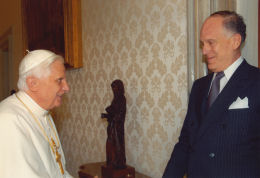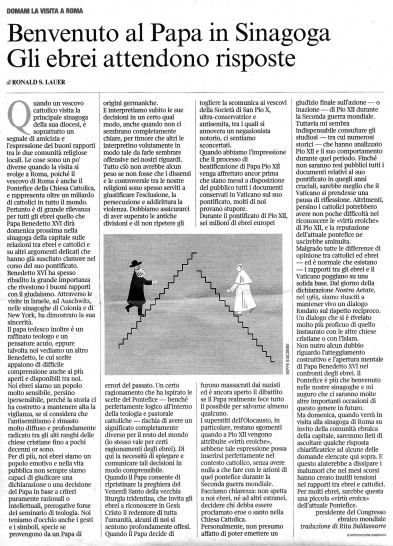Op-Ed: Ronald Lauder calls on Pope Benedict XVI to clarify Vatican's stance on Pius XII
16 Jan 2010The following opinion article by World Jewish Congress President Ronald S. Lauder was published by the leading Italian newspaper ‘Corriere della Sera’ on the eve of Pope Benedict’s visit to the Great Synagogue of Rome:
Time for a few illuminating words
By Ronald S. Lauder
When a Catholic bishop visits the main synagogue in his diocese it is first and foremost a mark of friendship and an expression of the good relationship between the two local religious communities. Things are somewhat different when such a visit occurs in Rome, as the Bishop of Rome is also pontiff of the Catholic Church, representing more than a billion Catholics world-wide.
It is therefore important to Jews around the world what Pope Benedict XVI has to say this Sunday in Rome’s main synagogue on the Jewish-Catholic relationship and on a number of sensitive issues has already caused a sensation during his pontificate thus far.
Benedict XVI has often emphasized how important good relations to Judaism are to him. Through his trips to Israel, to Auschwitz, and his visits to synagogues in Cologne and New York, he has proved that he is sincere. The German-born Pope has always been an outstanding theologian and a sharp-witted thinker. And yet, sometimes we see another Benedict, one who surprises us with decisions that – even for the well-meaning amongst us – are difficult to comprehend.
The German-born Pope has always been an outstanding theologian and a sharp-witted thinker. And yet, sometimes we see another Benedict, one who surprises us with decisions that – even for the well-meaning amongst us – are difficult to comprehend.
We Jews are generally very sensitive folk; some would say over-sensitive – although history has given us enough reason to be vigilant, given that anti-Semitism was very widespread and deeply rooted in the higher echelons of the Christian churches until a few decades ago.
Moreover, we Jews are an emotional people, and in public life we don’t always judge a statement or a decision made by the Pope by purely rational or intellectual criteria which perhaps are the hallmarks of a theological seminary. We pay close attention to gestures and symbols, especially from a Pope of German origin.
And we are quick to interpret his decisions in a certain way, even when they do not appear entirely obvious to us, because we always fear that others will deliberately interpret them in a way that one could regard as offensive to us.
All of this wouldn’t matter much had not dissent and controversies between our religions often served as justification for exclusion, persecution, and even violence. We need to make sure that we overcome former divisions and do not repeat the mistakes of the past.
Certain reasoning and decision-making by the Pope that is perfectly logical within the framework of Catholic theology and teaching can have a completely different meaning for the outside world (the same also applies to Jewish thinking), hence the need to explain and communicate these decisions in a comprehensible fashion.
When the Pope allows the use of the Good Friday Prayer of the old Tridentine liturgy, which calls for Jews to acknowledge Jesus Christ as the Savior of all men, some of us are deeply hurt.
When the Pope decides to lift the excommunication of bishops of the ultra-conservative and anti-Semitic Society of St. Pius X, among them a notorious Holocaust denier, we are upset.
When we have the impression that the beatification process of Pope Pius XII is being rushed through before all the documentation kept by the Vatican on this pontificate is revealed, many of us are disturbed. During that Pope’s pontificate, six million Jews in Europe were murdered by the Nazis, and there is an on-going debate about whether Pius XII really did all in his power to save at least some of them.
Holocaust survivors in particular feel upset when “heroic virtues” are accorded to Pius XII, even though that may make perfect sense within the inner-Catholic framework and may have nothing to do with his actions during World War II. To be clear: is it neither up to us Jews, nor to other outsiders, to decide who should be declared a hero or a saint of the Catholic Church. I also do not presume to be in a position to render a final judgment on Pius’ actions - or inaction - during World War II.
Yet those who view Pius XII and his behavior during that period critically – among them many historians – should be heard before irreversible decisions are taken hastily. Until all papers relating to Pius XII during the crucial period are accessible, the Vatican would be well advised to pause for a moment. Otherwise, even Catholics might have great trouble in recognizing the “heroic virtues” of Pius XII, and the reputation of the present Pope would consequently also suffer some damage.
Despite all these differences in opinion between Catholics and Jews – and it is only normal that they exist – the relationship between Jews and the Vatican is based on a solid foundation. We have managed, since the 1965 Declaration Nostra Aetate, to maintain a dialogue based on mutual trust. This dialogue is much more advanced than that with other Christian denominations, or with Islam.
I harbor no doubts whatever about the positive attitude and open-mindedness of Pope Benedict XVI vis-à-vis the Jews. He is more than welcome in our synagogues and I hope there will be many more such important occasions in the future.
However, on Sunday, when he pays a visit to Rome’s main synagogue on the invitation of the local Jewish community, we would welcome a few illuminating answers to some of the questions I outlined above. That could help dispel some of the irritations of the past months that have unnecessarily strained Jewish-Catholic relations.
Many Jews would recognize that as a small “heroic virtue” of the Pope.
Italian version of the article, as published by 'Corriere della Sera' on 16 January 2010:
Benvenuto al Papa in Sinagoga – Gli ebrei attendono riposte
di Ronald S. Lauder
Quando un vescovo cattolico visita la principale sinagoga della sua diocesi, è soprattutto un segnale di amicizia e l'espressione dei buoni rapporti tra le due comunità religiose locali. Le cose sono un po' diverse quando la visita si svolge a Roma, poiché il vescovo di Roma è anche il Pontefice della Chiesa Cattolica, e rappresenta oltre un miliardo di cattolici in tutto il mondo.
Pertanto è di grande rilevanza per tutti gli ebrei quello che Papa Benedetto XVI dirà domenica prossima nella sinagoga della capitale sulle relazioni tra ebrei e cattolici e su altri argomenti delicati che hanno già suscitato clamore nel corso del suo pontificato.
 Benedetto XVI ha spesso ribadito la grande importanza che rivestono i buoni rapporti con il giudaismo. Attraverso le visite in Israele, ad Auschwitz, nelle sinagoghe di Colonia e di New York, ha dimostrato la sua sincerità.
Benedetto XVI ha spesso ribadito la grande importanza che rivestono i buoni rapporti con il giudaismo. Attraverso le visite in Israele, ad Auschwitz, nelle sinagoghe di Colonia e di New York, ha dimostrato la sua sincerità.
Il papa tedesco inoltre è un raffinato teologo e un pensatore acuto, eppure talvolta noi vediamo un altro Benedetto, le cui scelte appaiono di difficile comprensione anche ai più aperti e disponibili tra noi.
Noi ebrei siamo un popolo molto sensibile, persino ipersensibile, perché la storia ci ha costretto a mantenere alta la vigilanza, se si considera che l'antisemitismo è rimasto molto diffuso e profondamente radicato tra gli alti ranghi delle chiese cristiane fino a pochi decenni or sono.
Per di più, noi ebrei siamo un popolo emotivo e nella vita pubblica non sempre siamo capaci di giudicare una dichiarazione o una decisione del Papa in base a criteri puramente razionali o intellettuali, prerogative forse del seminario di teologia. Noi teniamo d'occhio anche i gesti e i simboli, specie se provengono da un Papa di origini germaniche.
E interpretiamo subito le sue decisioni in un certo qual modo, anche quando non ci sembrano completamente chiare, per timore che altri le interpretino volutamente in modo tale da farle sembrare offensive nei nostri riguardi.
Tutto ciò non avrebbe alcun peso se non fosse che i dissensi e le controversie tra le nostre religioni sono spesso serviti a giustificare l'esclusione, la persecuzione e addirittura la violenza. Dobbiamo assicurarci di aver superato le antiche divisioni e di non ripetere gli errori del passato. Un certo ragionamento che ha ispirato le scelte del Pontefice - benché perfettamente logico all'interno della teologia e pastorale cattoliche - rischia di avere un significato completamente diverso per il resto del mondo (lo stesso vale per certi ragionamenti degli ebrei). Di qui la necessità di spiegare e comunicare tali decisioni in modo comprensibile.
Quando il Papa consente di ripristinare la preghiera del Venerdì Santo della vecchia liturgia tridentina, che invita gli ebrei a riconoscere in Gesù Cristo il redentore di tutta l'umanità, alcuni di noi si sentono profondamente offesi.
Quando il Papa decide di togliere la scomunica ai vescovi della Società di San Pio X, ultra-conservatrice e antisemita, tra i quali si annovera un negazionista notorio, ci sentiamo sconcertati.
Quando abbiamo l'impressione che il processo di beatificazione di Papa Pio XII venga affrettato ancor prima che siano messi a disposizione del pubblico tutti i documenti conservati in Vaticano sul suo pontificato, molti di noi provano stupore.
Durante il pontificato di Pio XII, sei milioni di ebrei europei furono massacrati dai nazisti ed è ancora aperto il dibattito se il Papa realmente fece tutto il possibile per salvarne almeno qualcuno.
I superstiti dell'Olocausto, in particolare, restano sgomenti quando a Pio XII vengono attribuite «virtù eroiche», sebbene tale espressione possa inserirsi perfettamente nel contesto cattolico, senza avere nulla a che fare con le azioni di quel pontefice durante la Seconda guerra mondiale. Facciamo chiarezza: non spetta a noi ebrei, né ad altri estranei, decidere chi debba essere proclamato eroe o santo nella Chiesa Cattolica.
Personalmente, non presumo affatto di poter emettere un giudizio finale sull'azione - o inazione - di Pio XII durante la Seconda guerra mondiale.
Tuttavia mi sembra indispensabile consultare gli studiosi - tra cui numerosi storici - che hanno analizzato Pio XII e il suo comportamento durante quel periodo. Finché non saranno resi pubblici tutti i documenti relativi al suo pontificato in quegli anni cruciali, sarebbe meglio che il Vaticano si prendesse una pausa di riflessione. Altrimenti, persino i cattolici potrebbero avere non poche difficoltà nel riconoscere le «virtù eroiche» di Pio XII, e la reputazione dell'attuale pontefice ne uscirebbe sminuita.
Malgrado tutte le differenze di opinione tra cattolici ed ebrei - ed è normale che esistano - i rapporti tra gli ebrei e il Vaticano poggiano su una solida base. Dal giorno della dichiarazione Nostra Aetate, nel 1965, siamo riusciti a mantener vivo un dialogo fondato sul rispetto reciproco. Un dialogo che si è rivelato molto più proficuo di quello instaurato con le altre chiese cristiane o con l'Islam.
Non nutro alcun dubbio riguardo l'atteggiamento costruttivo e l'apertura mentale di Papa Benedetto XVI nei confronti degli ebrei. Il Pontefice è più che benvenuto nelle nostre sinagoghe e mi auguro che ci saranno molte altre importanti occasioni di questo genere in futuro.
Ma domenica, quando verrà in visita alla sinagoga di Roma su invito della comunità ebraica della capitale, saremmo lieti di ascoltare qualche risposta chiarificatrice ad alcune delle domande elencate qui sopra. E questo aiuterebbe a dissipare i malumori che nei mesi scorsi hanno creato inutili tensioni nei rapporti tra ebrei e cattolici.
Per molti ebrei, sarebbe questa una piccola «virtù eroica» dell'attuale Pontefice.
[traduzione di Rita Baldassarre]